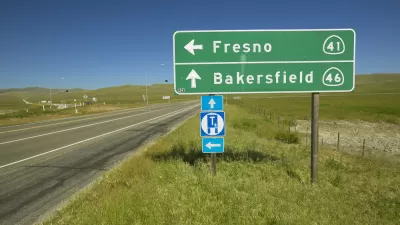The New York Times, San Francisco Chronicle, and Sacramento Bee editorialize on the signing of SB 375, California's new landmark law that is intended to reduce greenhouse gas emissions by reducing vehicle miles traveled through better land use.
From the New York Times:
"For years, while Washington slept, most of the serious work on climate change has occurred in the states, and no state has worked harder than California. The latest example of California's originality is a new law - the nation's first - intended to reduce greenhouse gas emissions by curbing urban sprawl and cutting back the time people have to spend in their automobiles."
"The bill contains significant incentives, including the promise of substantial federal and state money to regions whose plans pass muster. In addition, and with the consent of the environmental community, the state will relax various environmental rules to allow "infill" - higher-density land use in or near cities and towns.
Given California's size, these and other initiatives will help reduce global greenhouse gas emissions."
From the San Francisco Chronicle:
"It's a novel answer in many ways. While California has churned out rules for high-mileage vehicles, solar panels, clean-burning fuel, and efficient energy use, it's overlooked the everyday problem of long commute times from distant suburbs in carbon dioxide-spewing cars and trucks."
"The bill may take years to show its effects. As new homes and apartments go up, there could be a break from California-style sprawl as construction fills in city lots and residents see the opportunities close to city centers. On the atmospheric scale, some 30 percent of the greenhouse gas emissions presently come from cars and trucks, a figure that could gradually drop as driving patterns shift from distant suburbs to shorter routes closer to work."
From the Sacramento Bee:
"More than any previous law, Steinberg's seeks to address one of California's nagging flaws – its Wild West patterns of development. Housing separated from jobs has led to traffic jams, smog, long-distance commutes, loss of valuable farmland and transit systems that can't easily build ridership.
SB 375, by itself, won't stop this kind of "dumb growth." But it will discourage it – and help create more sustainable communities – with a mix of incentives and regulatory relief."
Thanks to Virginia Harris
FULL STORY: Editorial: Cut the Sprawl, Cut the Warming

Planetizen Federal Action Tracker
A weekly monitor of how Trump’s orders and actions are impacting planners and planning in America.

Restaurant Patios Were a Pandemic Win — Why Were They so Hard to Keep?
Social distancing requirements and changes in travel patterns prompted cities to pilot new uses for street and sidewalk space. Then it got complicated.

Map: Where Senate Republicans Want to Sell Your Public Lands
For public land advocates, the Senate Republicans’ proposal to sell millions of acres of public land in the West is “the biggest fight of their careers.”

Maui's Vacation Rental Debate Turns Ugly
Verbal attacks, misinformation campaigns and fistfights plague a high-stakes debate to convert thousands of vacation rentals into long-term housing.

San Francisco Suspends Traffic Calming Amidst Record Deaths
Citing “a challenging fiscal landscape,” the city will cease the program on the heels of 42 traffic deaths, including 24 pedestrians.

California Homeless Arrests, Citations Spike After Ruling
An investigation reveals that anti-homeless actions increased up to 500% after Grants Pass v. Johnson — even in cities claiming no policy change.
Urban Design for Planners 1: Software Tools
This six-course series explores essential urban design concepts using open source software and equips planners with the tools they need to participate fully in the urban design process.
Planning for Universal Design
Learn the tools for implementing Universal Design in planning regulations.
Heyer Gruel & Associates PA
JM Goldson LLC
Custer County Colorado
City of Camden Redevelopment Agency
City of Astoria
Transportation Research & Education Center (TREC) at Portland State University
Camden Redevelopment Agency
City of Claremont
Municipality of Princeton (NJ)



























